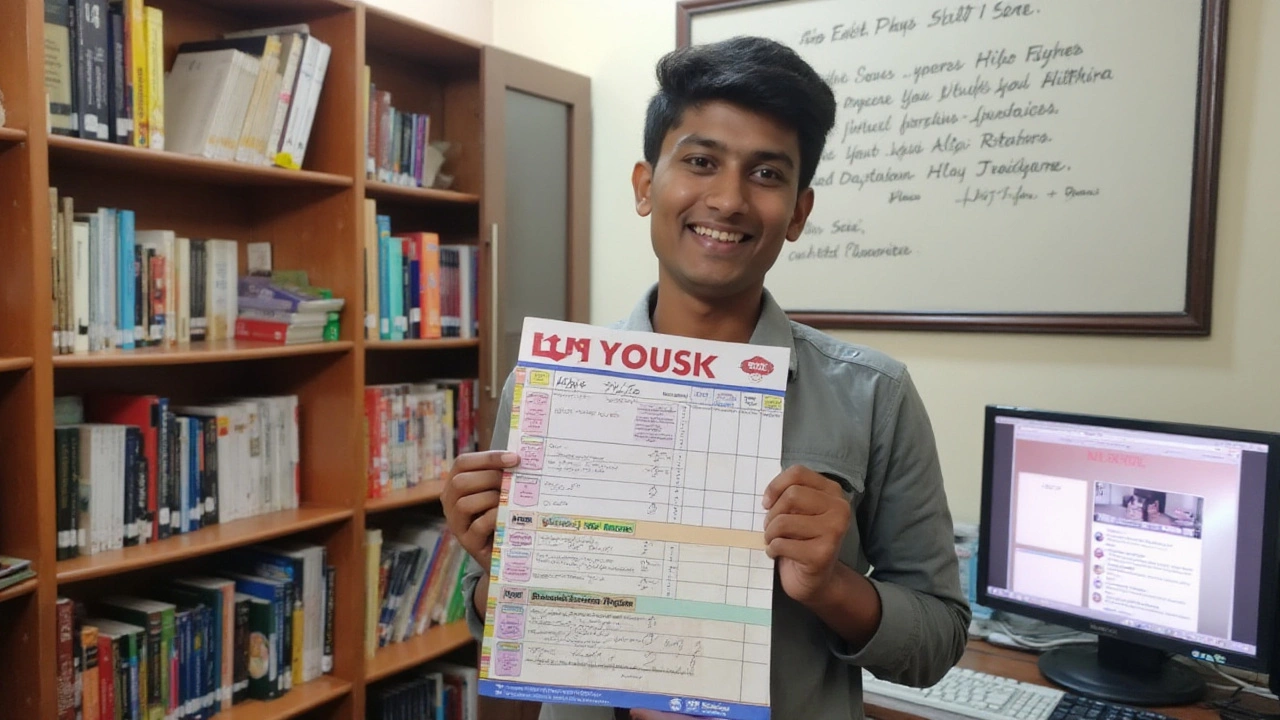Tackling the IIT JEE is like embarking on an ambitious adventure that requires not just intelligence but also a certain level of dedication and strategy. Preparation time varies for each individual, as it is often influenced by one's starting knowledge base, learning speed, and daily commitments. To outline a plan, a good first step is understanding your current level of readiness, followed by crafting a schedule that aligns with your goals.
What's most important is not the sheer number of hours you study, but how effectively you use those hours. Focusing on concepts and fundamentals while employing smart study techniques can considerably elevate your preparation process. Amidst all this, it becomes crucial to balance your study schedule with school activities and necessary leisure time to ensure your mental well-being.
- Understanding the IIT JEE Landscape
- Determining Your Starting Point
- Crafting a Study Schedule
- Effective Study Techniques
- Balancing School and Personal Time
- Setting Realistic Goals and Expectations
Understanding the IIT JEE Landscape
The IIT JEE is not just another entrance exam; it is a gateway to the most coveted engineering institutes in India. With its reputation for rigor, understanding the exam requires a deep dive into its structure and expectations. The exam is divided into two key parts: JEE Main and JEE Advanced. Each level serves a distinct purpose, with JEE Main acting as a qualifier for the Advanced examination. Success in JEE Advanced, then, heightens one's prospects to gain admission into an IIT.
A pertinent element in the IIT JEE landscape is the sheer volume of applicants. Each year, hundreds of thousands of aspirants vie for a limited number of seats. This significant competition, coupled with the challenging nature of the questions, means that only those with a comprehensive preparation strategy thrive. Knowing the study schedule and approach of past successful candidates could provide invaluable insights. Additionally, the exam encompasses a variety of subjects, including Physics, Chemistry, and Mathematics—each presenting a unique set of challenges and requiring distinct problem-solving skills.
Understanding the scoring and cutoff trends is also crucial. The cutoff marks decide whether a candidate has cleared the exam or needs more preparation. These marks fluctuate annually based on difficulty and overall performance of aspirants, thus making it imperative for candidates to be adaptive and resilient. An aspirant often requires a two-year preparation timeline, typically starting from class 11, though some begin even earlier, to fully absorb the complex concepts that are tested in the entrance exam.
"IIT JEE is not just about intelligence; it's about mental endurance," remarked renowned educationist, Dr. Anil Gupta, emphasizing the importance of strategizing preparation.Considering resources, numerous online platforms and coaching institutes offer study materials, practice tests, and mentorship, but it is important to discern which resources align best with one's learning style. Occasionally, a judicious mix of solitude and formal guidance works wonders. Diverse study aids such as NCERT books and IIT JEE preparation guides are crucial in building foundational knowledge.
Determining Your Starting Point
Embarking on your journey to prepare for the IIT JEE begins with a thorough assessment of your current understanding and skills. This crucial step can set the tone for your entire preparation strategy. Many students start with a diagnostic test—an intelligent way to gauge strengths and weaknesses across subjects like Mathematics, Physics, and Chemistry. Identifying areas that require more focus helps in directing your energies efficiently. You might come across several ready-made assessment tools online designed specifically for the IIT JEE aspirants.
Being honest and objective about your abilities is essential. It's easy to overestimate or underestimate oneself, but an accurate assessment will save time and effort in the long run. Reflect on your school performance and how you handle problem-solving under pressure. Some students prefer starting with past IIT JEE papers; this not only familiarizes them with the format but also highlights their performance compared to the paper’s requirements. It’s noteworthy that many toppers have mentioned how re-evaluating their initial problem areas led to remarkable turnarounds in their studies. Consider their insights while crafting your path.
"Review, recalibrate, and refocus on your weaknesses—let them become your strengths," advised a top scorer in an interview with Education Times.
Your study history is also a good indicator of where you stand. If you've begun early with foundational topics, perhaps the prep time reduces. But if you're serious about mastering the competitive landscape of this entrance exam, a deep dive into each subject's essential topics is non-negotiable. Keep in mind, the level of competition necessitates that each moment spent reviewing basic principles adds potential for maximizing your score.
Besides self-assessment, consider external evaluations such as coaching feedback or even peer reviews, which provide an unbiased view of your capabilities. While it may sound daunting, remember that this self-examination is akin to laying the foundation for a skyscraper—the higher you want to build, the stronger this initial assessment should be. And as you constantly measure progress against initial benchmarks, don't forget to adapt your study techniques to meet evolving challenges.

Crafting a Study Schedule
Creating a study schedule for the IIT JEE can feel like piecing together a complex puzzle. At first glance, the sheer volume of subjects to be covered might seem overwhelming, but with a focused approach, you can transform this into a manageable task. Start by assessing the time available to you. Many students preparing for the IIT JEE are also attending school or involved in other activities, so efficient time management becomes pivotal. Begin by plotting a weekly calendar and designate specific blocks for each subject.
Allocate adequate time slots for major subjects like Physics, Chemistry, and Mathematics. While it's common to spend roughly 6-8 hours of dedicated study time daily, productivity is more significant than quantity. Include short breaks between study sessions to keep your mind sharp. Consider starting your sessions with the topics you find most challenging while your mind is fresh. Progress towards subjects you enjoy or find easier as the day unfolds.
Regular revision is another component that often gets overlooked. Plan your schedule to cyclically revisit older topics—this aids in reinforcing memory and understanding. Utilizing weekends effectively for extended study hours or joint study groups can be beneficial. A study schedule should not just be about cramming but also about incorporating varied forms of learning like solving previous years' papers, engaging with video tutorials, and attending coaching sessions.
An important part of your study planner should be mock tests. Designate a day in the week, an afternoon or evening, dedicated to taking practice tests under exam conditions. Analyzing these assessments helps to identify weak areas and track progress over time. According to an experienced educator, "Mock tests don't just evaluate your knowledge; they build your stamina for the real exam scenario."
It’s crucial to update your study plan periodically. As you progress, some topics may require less attention, while others demand more focus. Stay flexible, adapting to what your ongoing evaluations suggest. Your motivation plays an integral role—you might want to include motivational quotes, visual boards, or reminders around your study room to keep spirits high. Always be ready to tweak your schedule if something isn't working.
Below is a suggested weekly study plan:
| Day | Subject Focus | Activity |
|---|---|---|
| Monday | Physics | Conceptual understanding and problem-solving |
| Tuesday | Chemistry | Practical applications and revisions |
| Wednesday | Mathematics | Practice algebra and calculus questions |
| Thursday | Physics | Mock test and review |
| Friday | Chemistry | In-depth topic study and practical experiments |
| Saturday | Mathematics and mixed subjects | Solving previous exam papers |
| Sunday | Flexible | Revisions and leisure |
Having a solid study plan is invaluable but remember, it’s just a part of the bigger picture. Your dedication and persistence are key drivers of success. Set realistic goals and celebrate small victories along the way, creating a positive and balanced journey towards IIT JEE preparation.
Effective Study Techniques
Navigating the arduous journey that is the IIT JEE demands more than just hard work; it requires an arsenal of smart study techniques. Cultivating an effective strategy hinges on understanding your personal learning style and blending a mix of methods and resources. One of the cornerstone techniques is active learning, where engaging with the material through discussions, practice problems, and teaching others can significantly solidify your grasp on complex subjects. Instead of passively reading textbooks, turn your study sessions into interactive experiences. For instance, summarizing what you read into your own words or explaining challenging concepts to a peer can accelerate your understanding.
Embracing technology can also play to your advantage. Numerous online platforms offer interactive lessons tailored for IIT JEE aspirants. These platforms provide visual aids, which are particularly beneficial for those who learn better through sights and sounds rather than text. Utilizing apps for timed quizzes can not only test your knowledge but also your speed, simulating the pressure of the actual exam day. Some subject matter experts believe that varied practice is key, advocating for a continuous cycle of learn-assess-adjust. This means after learning a new topic, assess your understanding through quizzes or practice exams, then adjust your study plan based on these results.
"Success is the sum of small efforts, repeated day in and day out," said Robert Collier, and this precisely fits the narrative of consistent study habits.
Additionally, organizing your study sessions using techniques such as the Pomodoro Technique can bolster your focus and productivity. This method involves studying in short, concentrated bursts of around 25 minutes followed by a five-minute break. Research has shown that breaking your study time into smaller intervals can significantly improve information retention over longer periods of uninterrupted study. Endorsing this method not only helps in reducing fatigue but also maintains enthusiasm over prolonged study durations. Another benefit comes from the power of review; revising material regularly is crucial to transferring knowledge from short-term to long-term memory.
An approach recommended by many educators is incorporating a mix of study schedule activities, ensuring a balance between theory and practical application. A technique called spaced repetition, where learning sessions are spread out over days or weeks, has been proven to enhance retention. For practical subjects like physics and chemistry, turning theoretical understanding into experiments or real-world applications can make learning more vivid and accessible. For instance, attempting to relate physics concepts to day-to-day life or performing small experiments at home can demystify abstract theories and make them easier to comprehend.
Lastly, being involved in study groups yields substantial benefits. Collaborating with like-minded peers provides exposure to different perspectives and problem-solving techniques, which can enhance your own understanding. These interactions often lead to healthy discussions and debates, aiding in clarifying doubts and structuring a comprehensive viewpoint on different topics. A proactive approach in such group settings also allows the exchange of study resources that might otherwise be overlooked when studying alone. Remember, the act of sharing knowledge reinforces learned material while potentially unlocking insights you might have missed.

Balancing School and Personal Time
As you prepare for the IIT JEE, finding a way to balance school and personal time becomes not just necessary but pivotal to your success. It's easy to get overwhelmed by the rigorous demands of preparing for such a competitive exam while simultaneously managing school responsibilities. However, with a well-structured plan, it's possible to achieve a harmonious balance. A large part of this balance involves prioritizing your time and committing to a schedule that allows you to cover your schoolwork and still focus on your IIT JEE preparation. This means creating a weekly planner where you allocate specific time slots for school assignments, JEE studies, and essential leisure activities. Remember, diversifying your time helps prevent burnout and keeps you motivated throughout your preparation journey.
Integrating your school curriculum with your IIT JEE study materials can be hugely beneficial. Many topics overlap, providing a dual advantage when studied cohesively. For instance, subjects like Physics and Chemistry usually have considerable overlap, allowing you to reinforce school topics with your JEE preparation. This approach not only saves time but also deepens your understanding. A tip here is to maintain subject-wise notes, which summarize key concepts in a consolidated form, benefiting both school exams and the entrance test.
The role of personal time cannot be understated. You need to recharge and maintain mental health. Including short breaks in your study routine can enhance productivity. According to a study from the University of Illinois, taking regular breaks during prolonged tasks can significantly improve focus and performance. With this in mind, ensure that amidst the academic focus, you're also setting aside time for hobbies, exercise, or simply unwinding with friends or family. Such activities act as a reset button, rejuvenating your mind for more effective study sessions.
Optimizing Schoolwork for IIT JEE
Another strategy is to engage with peers and teachers. Participating actively in school discussions can help clarify doubts, ensuring you're aligned with both school and competitive exam requirements. Establishing a study group with classmates can also be valuable, offering diverse perspectives and collaborative problem-solving opportunities."In learning, you will teach, and in teaching, you will learn," said Phil Collins, underscoring the benefits of collaborative learning dynamics.Diversifying your study mode, from solo learning to group studies, can offer comprehensive insights, making preparation less daunting.
For statistics enthusiasts or data-driven minds, consider analyzing your study efficiency through a timetable tracker. You could maintain a simple table noting the time spent on school, JEE preparation, and personal activities each week. This visualization can help you objectively assess if you're dedicating adequate time to each, allowing you to tweak your schedule proactively. It can look something like this:
| Activity | Hours per week |
|---|---|
| School Work | 20 |
| IIT JEE Preparation | 30 |
| Leisure/Personal Time | 10 |
Remember, maintaining a balance isn't about equally dividing time, but maximizing how effectively each hour is spent. A schedule that reflects smart work can distinguish a successful preparation period from a stressful, unproductive one. Each individual has unique needs, so it's crucial to adjust these strategies to suit personal preferences and strengths, ensuring a balanced, rewarding journey towards conquering the entrance exam.
Setting Realistic Goals and Expectations
When embarking on the journey to conquer the IIT JEE, setting realistic goals and expectations forms the bedrock of effective preparation. Many students are often overwhelmed by the magnitude of the exam's syllabus and the fierce competition they are bound to face. However, it's crucial to remember that this exam is not an insurmountable peak. With a mix of strategy, consistency, and realistic milestones, you can certainly accomplish your objectives. Begin by understanding the foundational subjects you are most comfortable with, as these will serve as motivational anchors to build confidence and maintain positive momentum.
Create a daily or weekly timetable that segments study periods into digestible parts rather than an extensive, unrealistic cram session. Tackling subjects in smaller chunks allows for better retention and minimizes burnout. A strong rule of thumb is to engage with difficult topics when your mind is fresh, which could be in the early morning hours after a restful sleep. Acknowledge your achievement of each small goal as it can immensely uplift your morale. An example might include mastering a chapter in Physics by pinpointing conceptual problems and working through them one by one. According to a study by the Journal of Educational Psychology, acknowledging smaller goals leads to a 20% increase in motivation.
Balance and Flexibility
While it is key to have a structured plan, it's equally important to remain flexible. Life often throws curve balls, and adhering to a rigid timetable may bring unnecessary stress. For instance, unforeseen school assignments or family commitments may arise, demanding your immediate attention. In situations like this, adjust your study plan and perhaps incorporate extra time on weekends. Think of your schedule as a flexible guideline rather than an unyielding decree, allowing you to adapt and continue progressing without anxiety. So, if you miss a study session on a weekday due to a school marathon, remind yourself that you're still on track. This adaptability cultivates an atmosphere of discipline while preventing the suffocation of spontaneity.Equally important is periodically assessing your progress towards these set targets. Regular self-assessment helps diagnose areas that need more attention and may require you to recalibrate your goals. Many successful aspirants reward themselves with short breaks or activities they enjoy after completing a set study session. This can make studying less of a chore and more of a rewarding experience in itself. With the IIT JEE being synonymous with dedication and discipline, these strategies will aid in creating consistent habits that adhere to a clear yet flexible path forward.
Lastly, remember the importance of a support system. Study groups can provide unique perspectives and offer motivational support. Parents, teachers, and mentors play a vital role in this phase by helping set feasible objectives and providing encouragement when the stress levels rise. A shared understanding of realistic expectations with your support network will undoubtedly make the journey more enriching and attainable. Like a famous educator once said,
"It's not about having the knowledge, but it's about learning where you lack and making the necessary improvements."
